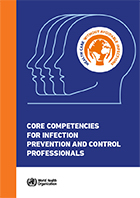
This resource can be used as a guide for identifying the needs of health care organizations regarding infection prevention and control (IPC) professional staff. It can also be used for assessing the training needs of IPC professionals and developing institutional curricula for IPC postgraduate courses/certificates/diplomas in combination with education and training curricula and evaluation tools that may be already in place locally. Furthermore, it can be useful for self-evaluation, performance appraisal, development of tools for knowledge evaluation, and related professional development activities. Finally, it may be used to develop a career path by identifying the needed skills for a junior versus a senior IPC professional – defining who is the IPC professional, identify what core competencies are to be qualified in this discipline and at what level, junior versus senior.
The core components included in this resource are: (i) infection prevention and control programme management and leadership; (ii) built environment in health care facilities; (iii) basic microbiology; (iv) antimicrobial resistance prevention; (v) health care-associated infection surveillance; (vi) standard precautions; (vii) transmission-based precautions; (viii) decontamination and reprocessing of medical devices and equipment; (ix) catheter-associated bloodstream infection prevention; (x) catheter-associated urinary tract infection prevention; (xi) surgical site infection prevention; (xii) prevention of health care-associated pneumonia; (xiii) health care-associated outbreak prevention and management; (xiv) infection prevention and control education and training; (xv) quality and patient safety; and (xvi) occupational health.
Related Documents
Minimum requirements for infection prevention and control programmes
